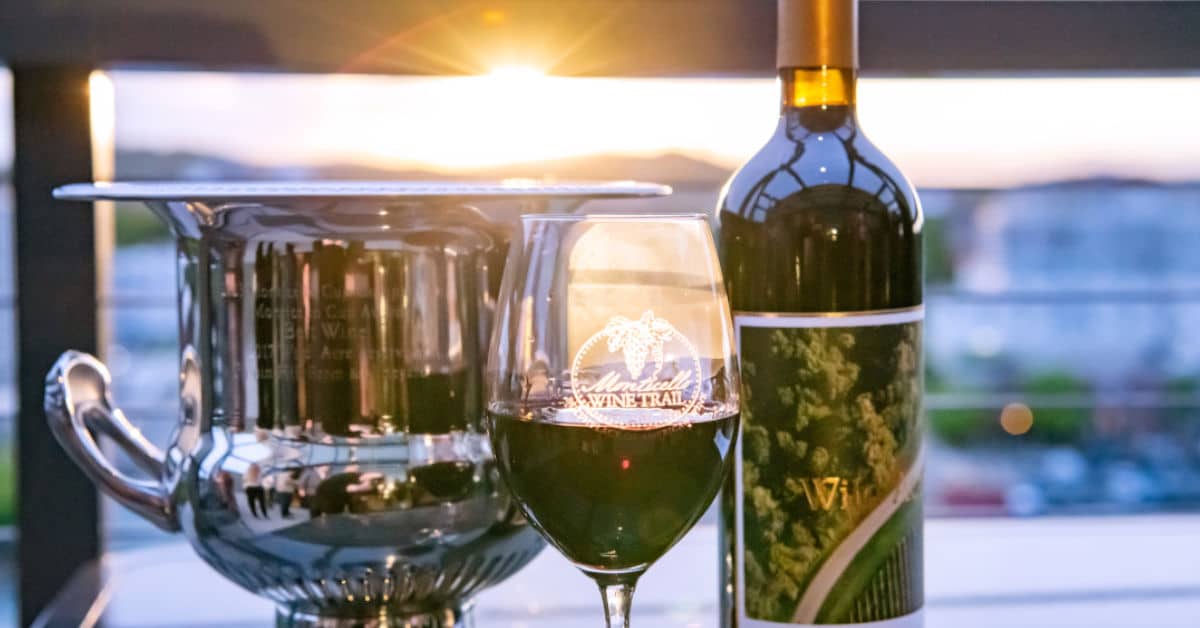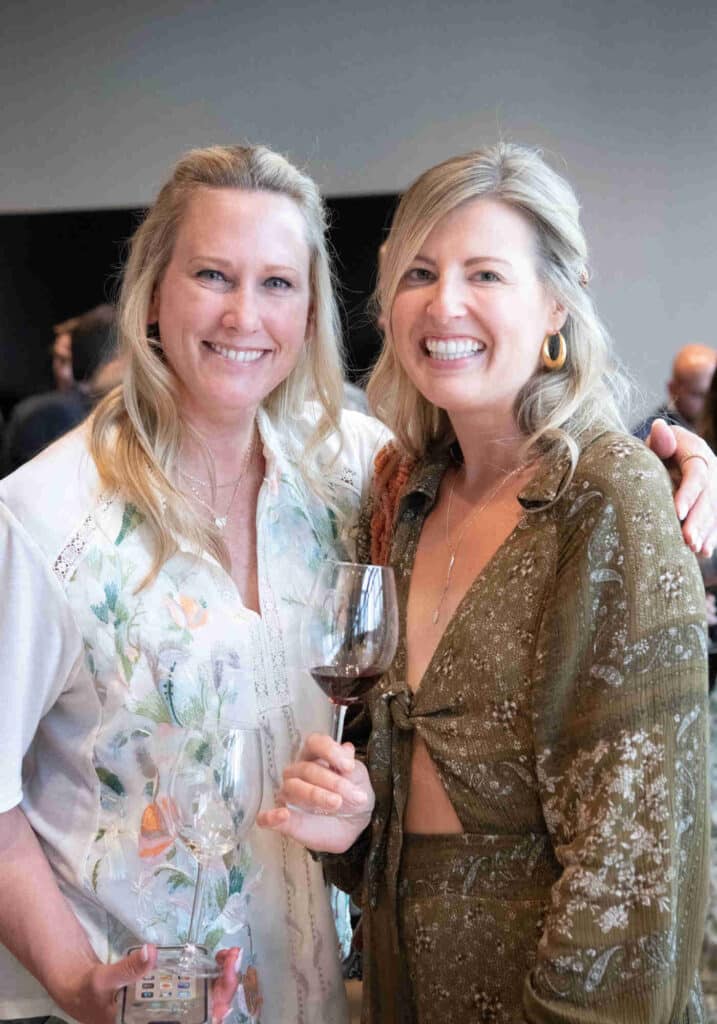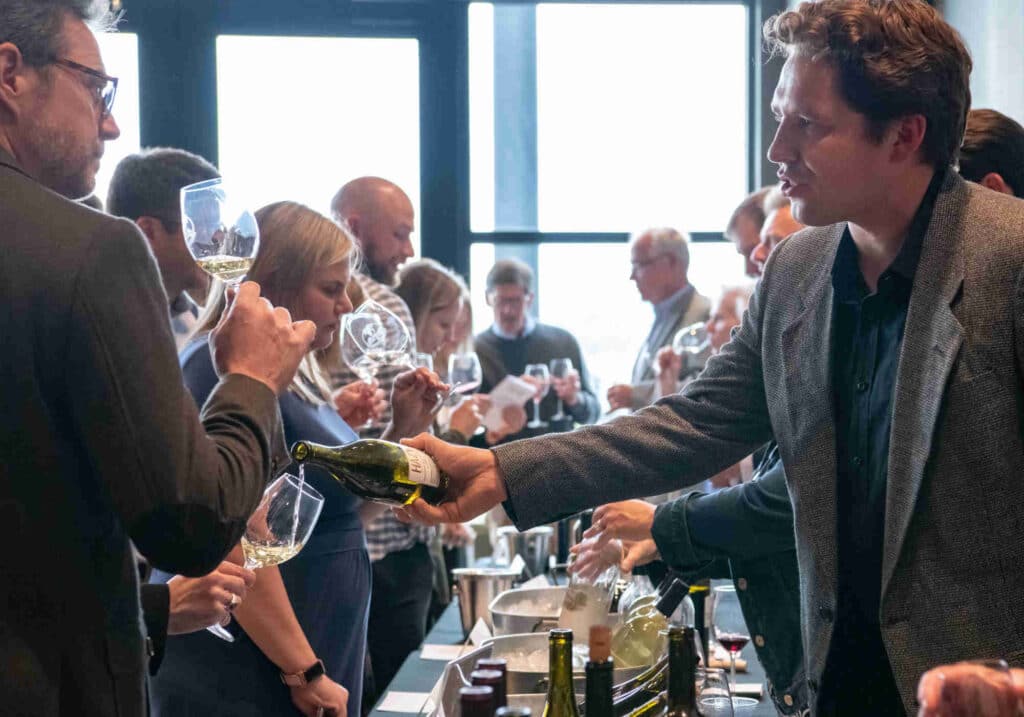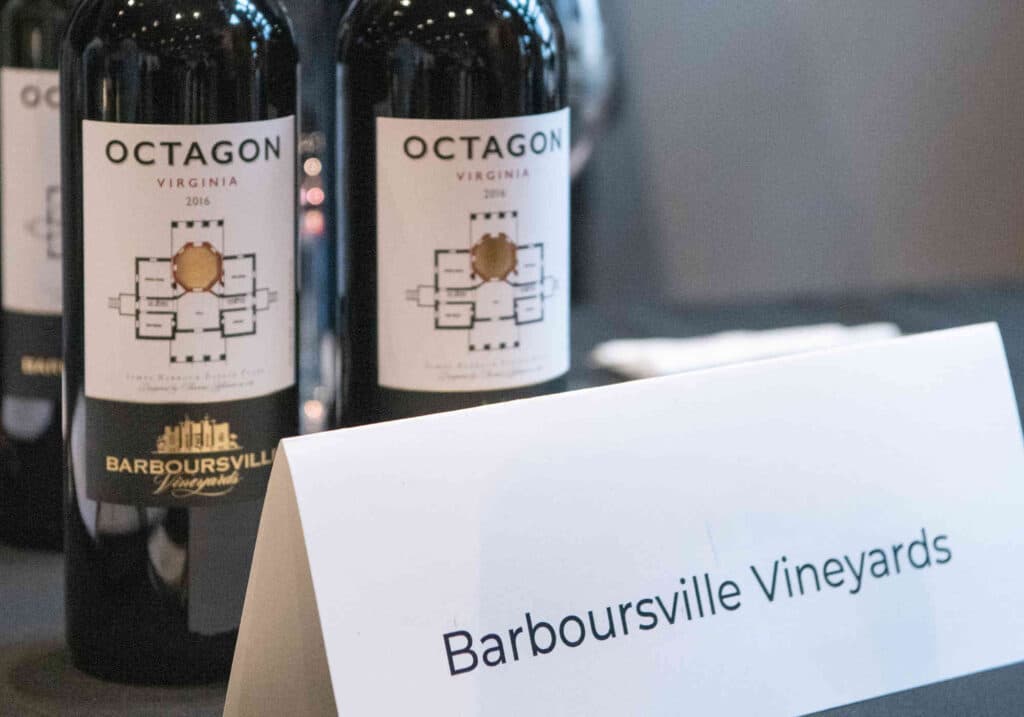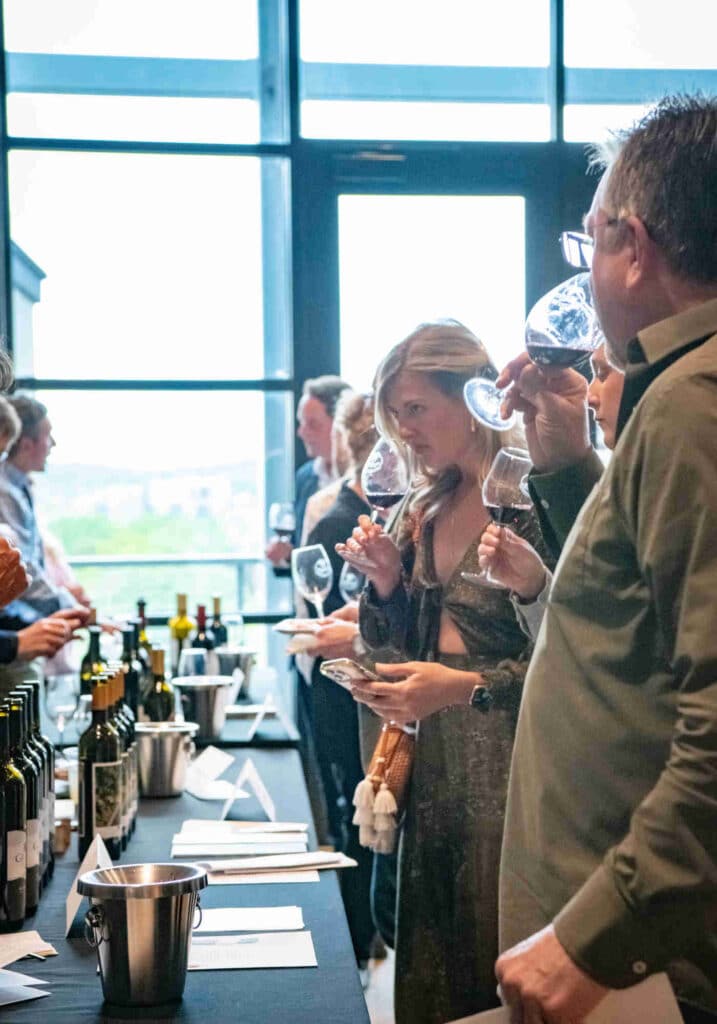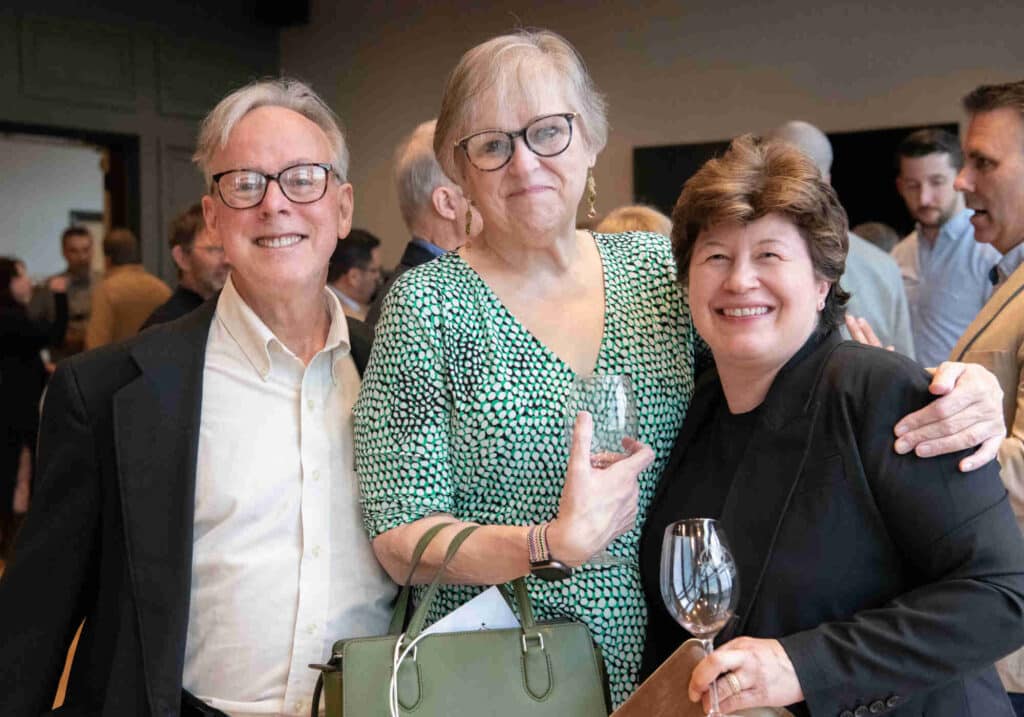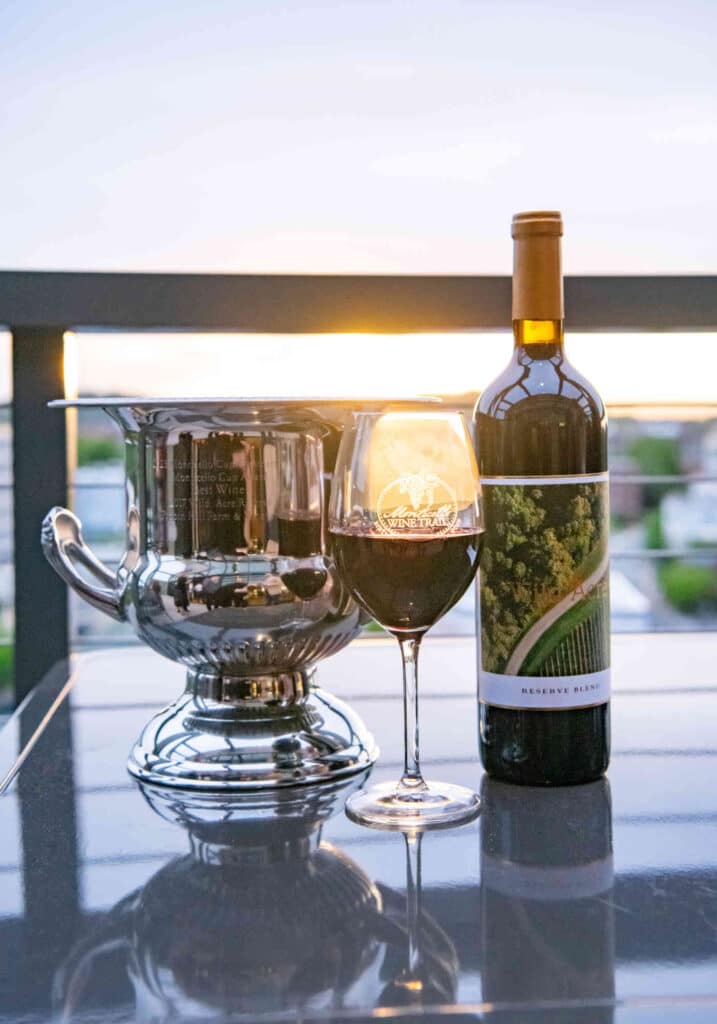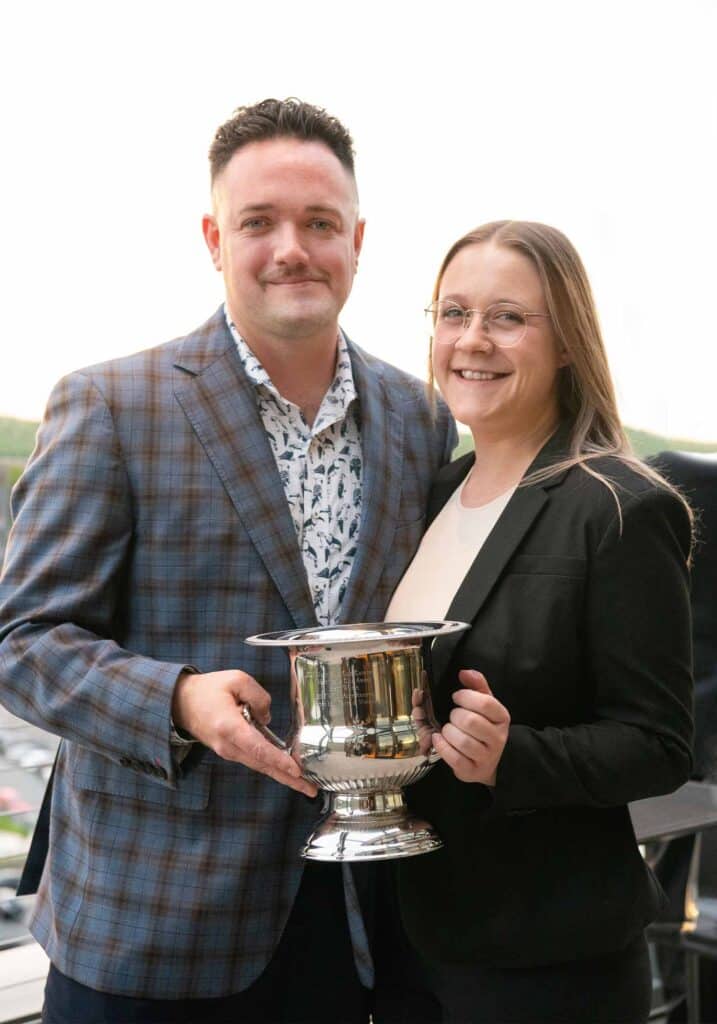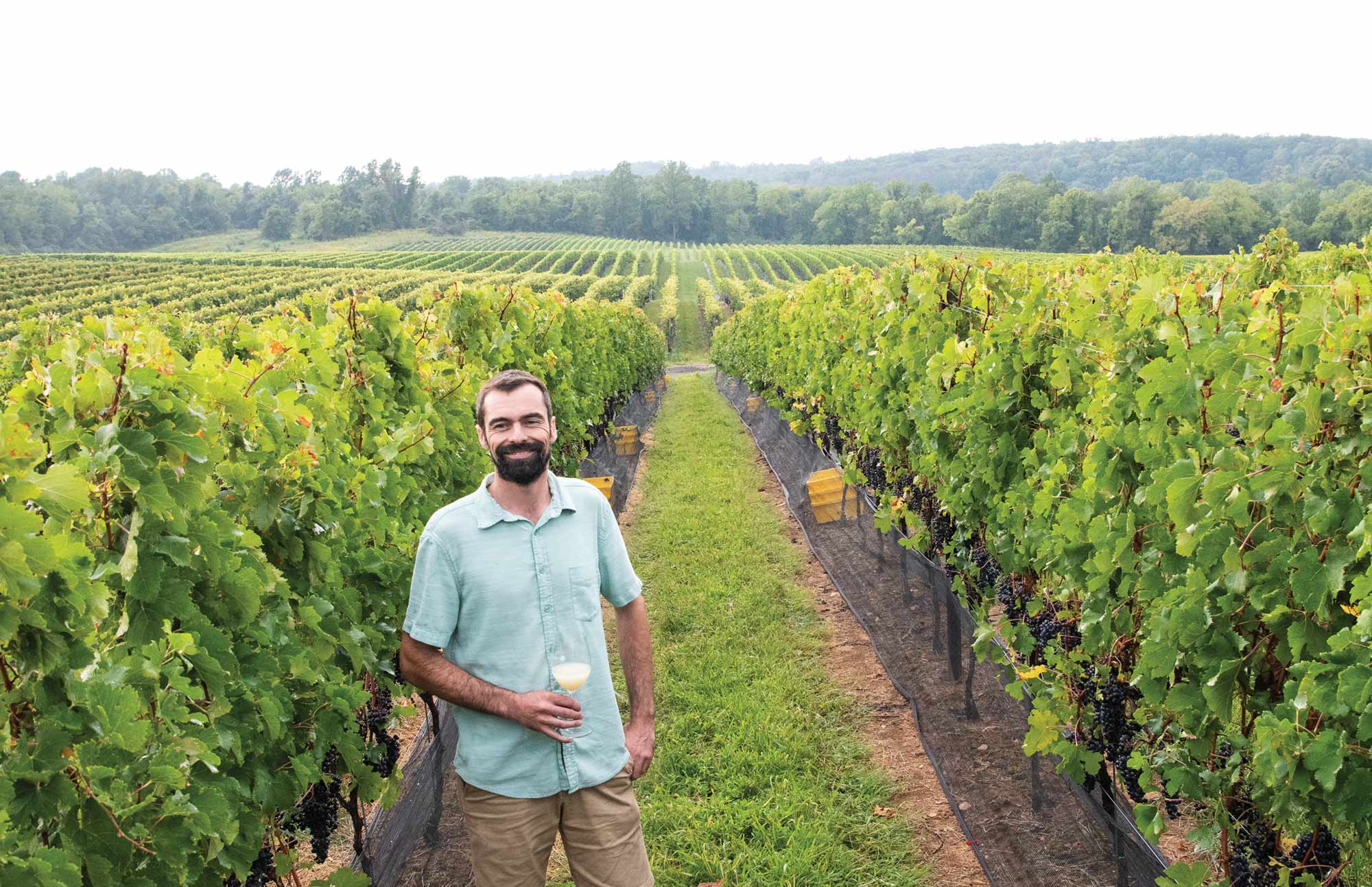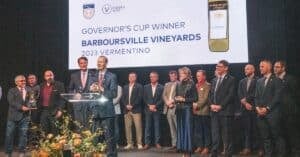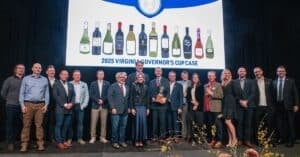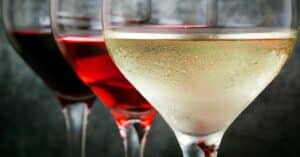On Tuesday May 2nd, the Virginia Wine Industry gathered at Level10 C’ville for the Monticello Cup awards ceremony and a celebration of Charlottesville Wine Country in the Monticello AVA. The 17 wines the judges had awarded gold medals to were on display and ready for attendees to taste. Guests mingled and sampled wine accompanied by hors d’oeuvres and a decadent charcuterie spread.
Top right: Frank Morgan, event organizer and celebrated wine writer. Bottom left: winemaker Emily Hodson of Veritas Vineyards & Winery, left, with Paige Poprocky, wine expert and social media manager for the Monticello Wine Trail.
The 2023 Monticello Cup Award Guidelines
To qualify for entry, a wine must consist of at least 85% grapes grown in the Monticello American Viticultural Area (AVA) and be produced by a member of the Monticello Wine Trail. This year wineries affiliated with the trail entered 57 wines in total.
In early April, 15 wine professionals gathered at Valley Road Vineyards for a blind taste testing of all 57 wines, which included 40 red wines, 15 white and 2 sparklings. In the first round of blind taste tests by the expert judges, 17 wines won gold medals, meaning they scored more than 90 points out of 100. Silvers were awarded to 34 wines and another 6 wines won bronze medals. In the second, final round of judging, judges tasted and re-scored the 12 wines with the highest scores to determine the top 3 wines of the year and the winner of the coveted Monticello Cup.
The Monticello Wine Trail of Charlottesville
Originally founded in the early 1980s, the Monticello Wine Trail currently consists of about 40 wineries near Charlottesville, Virginia. The Monticello AVA derives its name from Thomas Jefferson’s Charlottesville home at Monticello. Jefferson loved France and his dream was to establish a local wine industry on par with Europe. He used part of his farmland at Monticello in an attempt to begin that process but was unsuccessful due to the challenges European grapes faced in the New World. However, one of the current wineries on the Monticello Wine Trail was established on the very property that Jefferson originally cultivated and named in his honor. Jefferson Vineyards has become one of the AVA’s best privately held wineries and was recently purchased by the Monticello Foundation, officially – and somewhat poetically – bringing it back into the fold of Jefferson’s legacy.
Bottom Right, left to right: Richard Leahy, wine expert and author; wine judge and advocate Kathy Wiedemann; Janine Aquino, expert consultant for agritourism, wine & vineyards
Announcing the Winners of the 2023 Monticello Cup
At 7:30, coordinator Frank Morgan stepped up to the microphone. Accompanying him was Laura Lavallee, the event organizer and co-owner of Wisdom Oak Winery, the 2022 Monticello Cup winner.
Morgan (seen below, beginning the presentation) started the ceremony by deferring to the President of the Monticello Wine Trail, winemaker Stephen Barnard. Barnard was unable to attend the event in person but did submit a video message, framed beautifully among his own vines. He extended his congratulations to the as-yet-unnamed winning winery and the rest of the winemakers in attendance. “I am so proud of you – of us,” he told the room. His presence was clearly missed, and even in video form he drew applause and cheers from attendees.
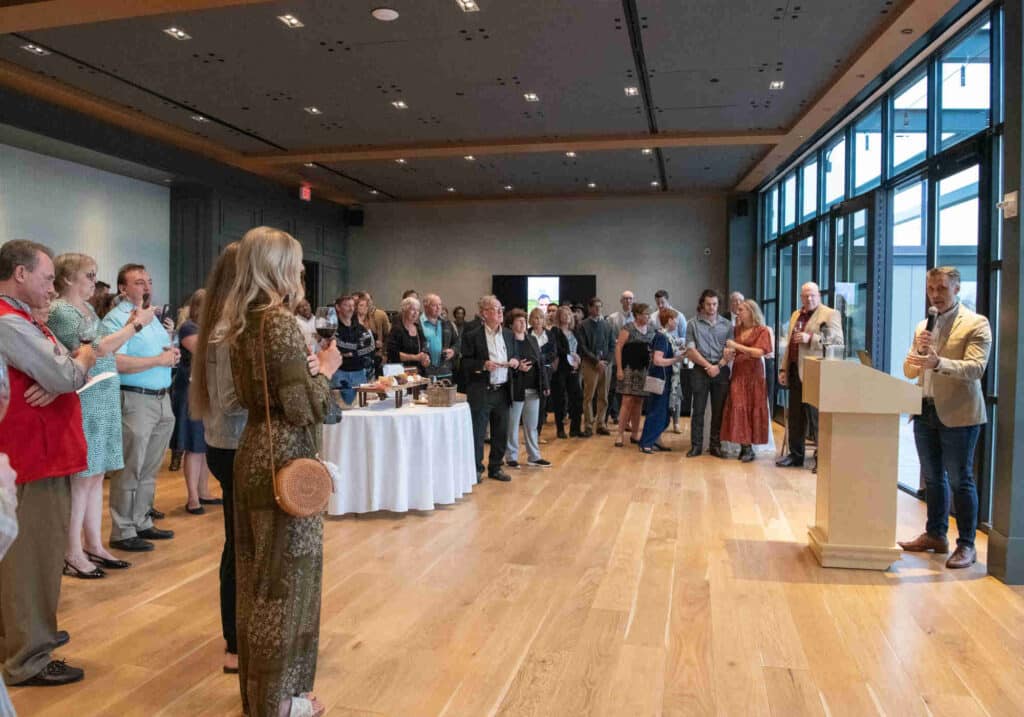
Morgan, a celebrated Virginia wine writer and judge, has managed the Monticello Cup Awards for the past five years. This year he tweaked the judging system a bit and limited each winery to submitting only two wines. “The goal is to make them really think about what their best wines are, where their strengths are shining right now,” Morgan said. The result of this change was an unquestionably stellar set of wines submitted – truly the best of the best of the Monticello AVA.
“The goal is to make [the wineries] really think about…where their strengths are shining right now.”
Morgan and Lavallee went on to call the winning winemakers up to the front of the room. Michael Shaps, veteran winemaker and inarguably the most prolific producer of Virginia Wine, was accompanied by Pollak Vineyards, Pippin Hill Farm & Vineyards and Veritas Vineyards & Winery. Morgan awarded Shaps the honor of “Best White Wine” for his 2019 Petit Manseng before turning to the top three wines of the night. Pollak took home third place, Veritas second, and the Monticello Cup was officially awarded to Pippin Hill Farm & Vineyards for their 2017 Wild Acre Reserve.
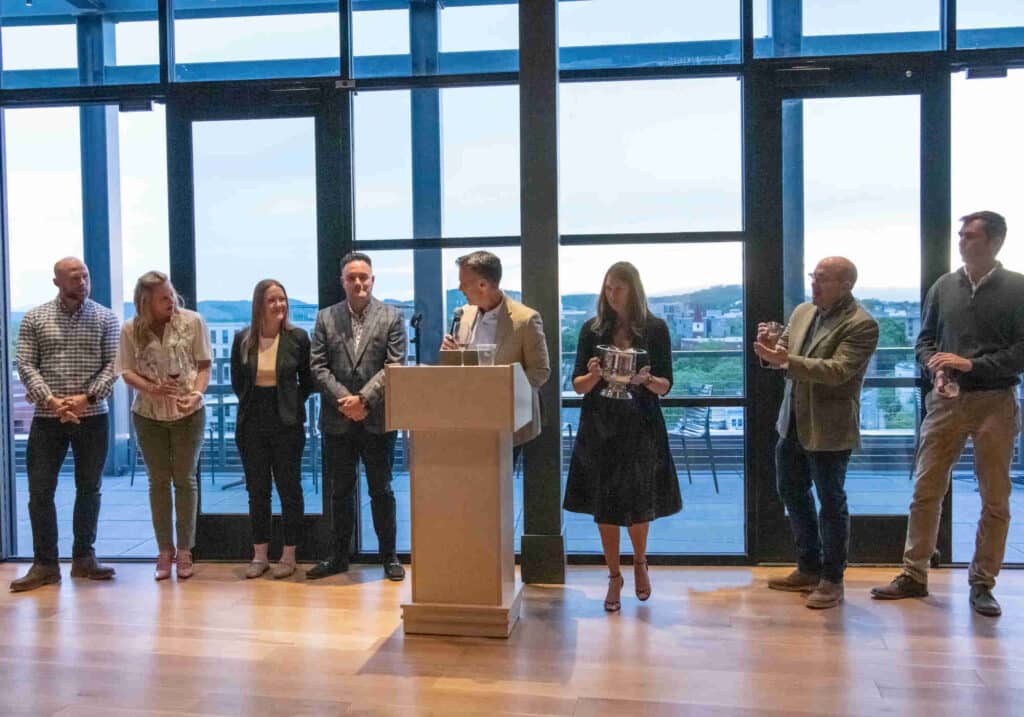
Above, eft to right: Elliot Watson, Veritas Vineyards’ associate winemaker; Emily Hodson, Veritas Vineyards’ head winemaker; Kylie Rhoads, Pippin Hill Farm & Vineyards’ vineyard manager; Brooks Hoover, Pippin Hill Farm & Vineyards’ production manager; Frank Morgan; Laura Lavallee, co-owner of Wisdom Oak Winery; Michael Shaps, owner and winemaker at Michael Shaps Wineworks; Benoit Pineau, Pollak Vineyards’ winemaker
Pippin Hill Farm & Vineyards’ First Monticello Cup Win
This Tannat and Cabernet Franc wine blend is on a winning streak. Winning the Monticello Cup came right on the heels of a Gold Medal placement in the statewide Governor’s Cup competition. This is the first Monticello Cup win for Pippin Hill Farm & Vineyards. The Wild Acre 2017 is also the vineyard’s first Tannat and Cabernet Franc blend.
Production manager Brooks Hoover accepted the award on behalf of Pippin Hill Farm & Vineyards alongside vineyard manager Kylie Rhoads. Hoover holds a degree in science and started his career at Pippin Hill in the fields before becoming the production manager and mastering the art of wine growing. Taking a keen interest in the science of winemaking as well, he took a year long sabbatical. He studied and worked alongside Pippin Hill’s winemaker, Michael Shaps, to learn as much as possible about the process. Now, meeting regularly with Shaps to check in on their wine’s progress, Brooks calls the shots on Pippin Hill’s wine in this dynamic collaboration. “This is all his work,” says Shaps, “I couldn’t be happier for him.”
Hoover has been drawn to red wine since he first developed an interest in the field. “Petit Verdot got me into wine originally,” he said, “but I see Tannat as being one of the future red grapes of the state. 2016 was a wet year, which was good for Tannat. As climate change continues, grapes that thrive in wetter climates are going to change the red wine landscape in Virginia.”
“I see Tannat as one of the future red grapes of the state…grapes that thrive in wetter climates are going to change the red wine landscape in Virginia.”
A Tannat Wine Blend Wins the Cup
Pippin Hill’s Wild Acre 2017 wine is 60% Tannat and 40% Cabernet Franc, with blackberry, black currant, clove, stewed cherry and allspice on the nose, notes of star anise, dark cocoa, black olive and porcini mushroom on the palate and a heavy tannic finish with medium acidity. The lengthy aging process both in the barrel and the bottle was intentional, to give Tannat – a very heavy grape with “a lot of vigor,” according to Hoover – time to settle. “You need to let it wait, let it evolve,” Hoover continued. These grapes were harvested in 2017 and left untouched for nearly 5 years before making it to the tasting room in 2022.
Above, left to right: Brooks Hoover and Kylie Rhoads
“The thing about Virginia is that it’s the hardest place in the world to grow good wine,” Hoover added, “but we’re coming out with award-winning wines year after year. That’s because the winemakers here thrive on the challenge. They come here to experiment and collaborate with each other. I could move to Napa and it would be easy to make a great wine. This is not easy – one year I lost my entire crop – but the payoff is worth it.” He credits a good deal of the success of Virginia wines to the spirit of cooperation, experimentation and collaboration between vineyards.
Tannat Wine in Virginia
Tannat is a red-wine grape whose origins lie in the Basque country, on the border between France and Spain. Here, in the shadow of the Pyrenees Mountains, the terrain is rough and rugged, so it is only fitting that Tannat should create wines which are equally deep, dark, dry and rustic. Tannat is best known as the dominant grape variety in Madiran, Southwest France’s most famous red wine. Although it is a French grape, Tannat (Vitis vinifera) grows remarkably well throughout the New World. Along with earthy flavors and spice, Tannat’s rich palate often showcases fruit flavors, including plum and raspberry. The wine tends to be high in acidity and tannins with a very full body. Aging it for 7-10 years will deepen the expressions of the wine through beautiful fruit and earth notes.
“Tannat is one of my two favorite grapes to grow,” enthused Sharon Horton, owner of Horton Vineyards. “I love deep reds.” A master winegrower with a long list of awards, Horton’s experience in growing grapes is well respected by industry professionals.
Tannat is fast becoming one of our more reliable red grape varieties in Virginia because it consistently ripens to ideal maturity, producing a heavily extracted yet balanced wine. It thrives in clay-rich calcareous soils and stony alluvial soils. “In France, this variety is known to be higher in acidity and tannins, but in central Virginia our hot climate and soils provide us with a much more balanced varietal composition,” shared Shaps.
Blending Tannat and Cabernet Franc
The 2017 Wild Acre Reserve from Pippin Hill Farm & Vineyards is the product of a marriage between the generosity of Tannat and the balance of Cabernet Franc. The synergy between the two is quite remarkable, with each variety lending the other its better parts. Virginia is known for producing excellent Cabernet Franc wines. In fact, it is considered among Virginia’s best varieties for red blends and is the second most planted varietal. It is a spicy wine with pepper flavors. Aromas can contain plum, blackberry, violets and notes of tobacco. Cabernet Franc is usually made into a dry oaked varietal wine in Virginia, but — as in the case of Pippin Hill’s Wild Acre Reserve — it also makes an excellent element in a red blend.
In France, Cabernet Franc is often used to add texture and a raspberry and blackcurrant aroma to red Bordeaux. Virginia soils produce a light-to-medium-bodied red wine that evokes raspberries and pencil shavings. A few Virginia producers are creating especially soft and juicy styles that are reminiscent of Pinot Noir.
Food Pairings for Tannat Wine
Red wines made from Tannat are classically deep-hued and intense with a lush kernel of black fruit, from plums to black cherry and cassis, wrapped in plenty of tannins that can range from bold to fine-grained and supple. Tannat pairs beautifully with strong cheeses, pastas, spicy dishes and roasted or grilled meats like spiced beef sausages, marinated lamb skewers and filet mignon burger.
The Tannat grape has a very dark skin and more seeds than most. It also has significantly more antioxidants (in the form of polyphenol) than other red grape varietals. This makes it especially heart-healthy. But these antioxidants also make it heavy in tannin, so it is best enjoyed in a blend like the 2017 Wild Acre Reserve from Pippin Hill or alongside strong foods.
Pippin Hill Farm & Vineyards
Pippin Hill Farm & Vineyards in North Garden is owned and run by the hospitality and event power couple Dean Easton and Lynn Porter of the Easton Porter Group. The property boasts an award-winning tasting room, an apiary and chicken coop, onsite herb and vegetable gardens for their farm-to-table fare and a large cutting flower garden among many other attractions. A recent addition to the gardens is a custom-built Alitex greenhouse, providing both a much-needed place to overwinter plants and start seeds but also an event location for Pippin Hill’s many farm-to-table classes and botanical workshops. The walkway leading up to the tasting room is lined with massive signature white hydrangea bushes, creating an iconic backdrop and helping to make the location a favorite Virginia Wine Country wedding venue.
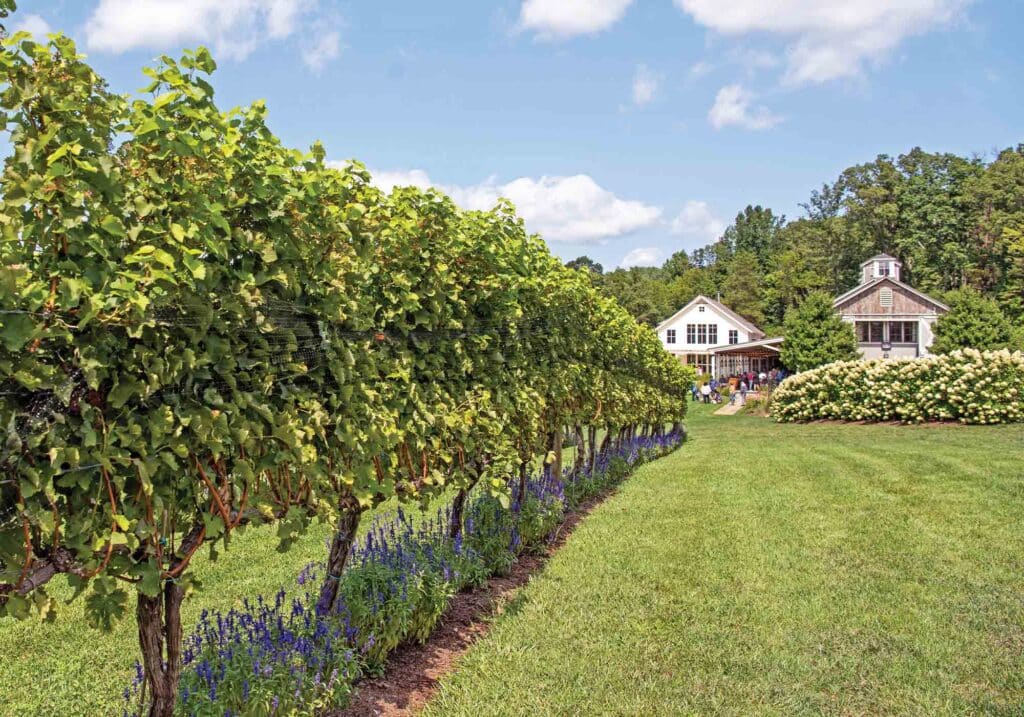
Pippin Hill’s property does have 5 acres under vine on-site, but the particular grapes for the Cup winner were grown at Grapelawn, one of their secondary locations in the region.
The Award-Winning Wines of the Monticello Cup
2021 Veritas Reserve
Veritas Vineyards & Winery
50% Petit Verdot, 30% Cabernet Franc, 15% Malbec and 5% Merlot, aged in 70% new oak.
The Reserve is the flagship of red blends at Veritas Vineyards & Winery. Winemaker Emily Hodson leads an intense sampling process of all the barrels in the cellar to decide the perfect master blend. The 2021 Vintage had a lengthy barrel as well as a recently implemented bottle aging regime. Hodson’s goal for the Reserve is an approachable structure yet great ageability. The blend on the 2021 Reserve is vastly different from previous vintages due to a very intense barrel program of 70% new oak. It is deep garnet in color and the bouquet is a deeply integrated balance of leather enveloped in an aroma of fresh black fruit.
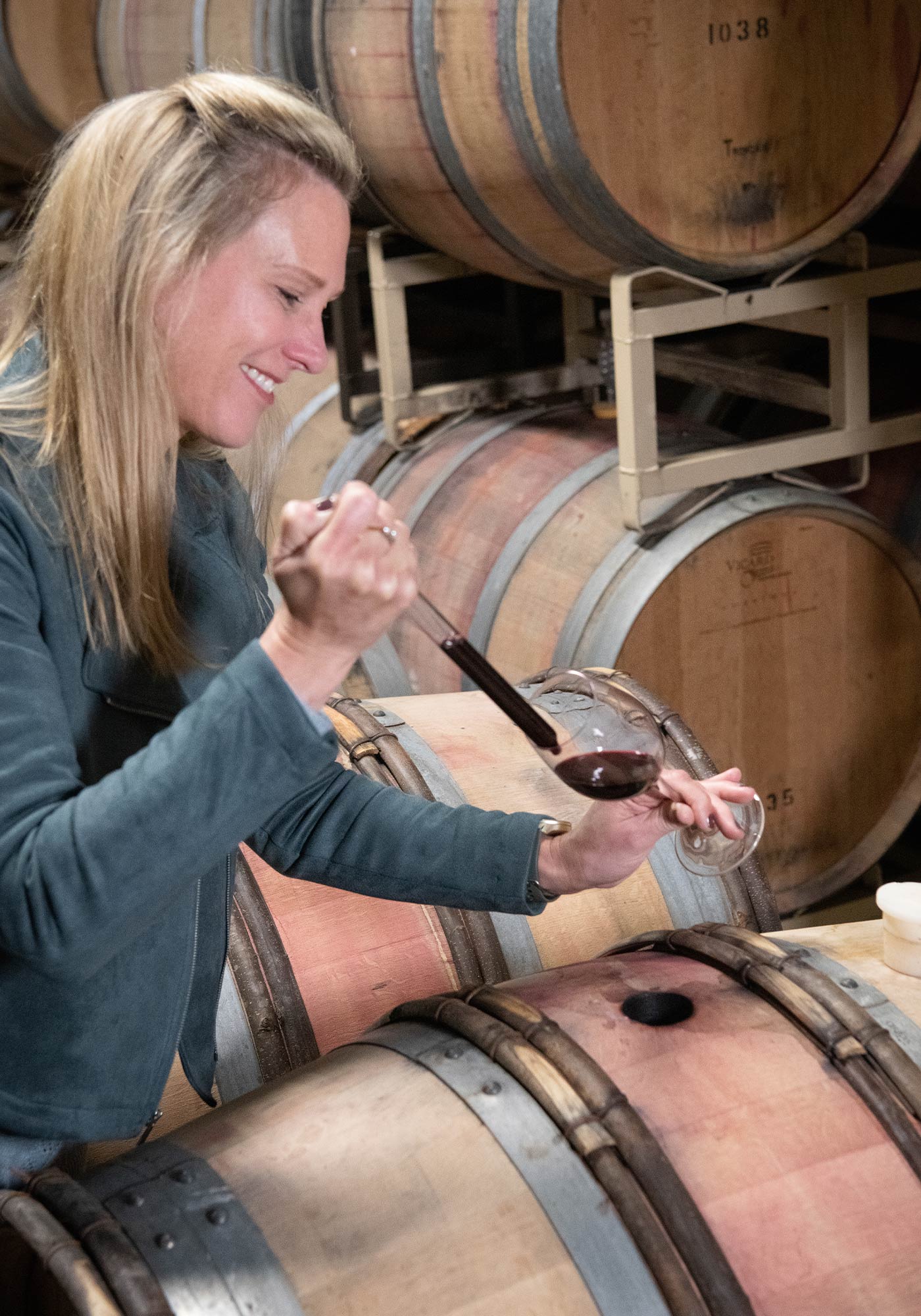
2019 Meritage
Pollack Vineyards
61% Merlot, 31% Cabernet Franc and 8% Petit Verdot, aged 18 months in 30% new oak.
Winemaker Benoit Pineau created this wine from a barrel selection of the best blocks from Pollak’s estate vineyards. The lots were blended shortly after malolactic fermentation and aged 18 months in French oak barrels (30% new, 70% neutral). This permitted the various components to come together for a nuanced flavor. This wine, produced in a Bordeaux style, presents as full-bodied with silky tannins and sound acidity to frame plums, blueberries and leather flavors.
Best White Wine of the Monticello Cup Awards
2019 Petit Manseng
Michael Shaps Wineworks
95% Petit Manseng, 5% Roussanne, aged in 75% new oak.
The 2019 vintage was an amazing growing season with very little rainfall, hot temperatures and an above-average yield. Most years Shaps blends in a small amount of Roussanne that grows next to their Petit Manseng. In 2019 he only added a small amount of Roussanne to help round out and soften the acidity in the Petit Manseng. The result was a more balanced and expansive wine.
This is a “big white” that expresses a beautiful aromatic complexity of grilled pineapple notes, apricots and peaches. The barrel notes are well integrated and add a good balance to the bright acidity. This wine will age and continue to express itself for 5-7 years after bottling.
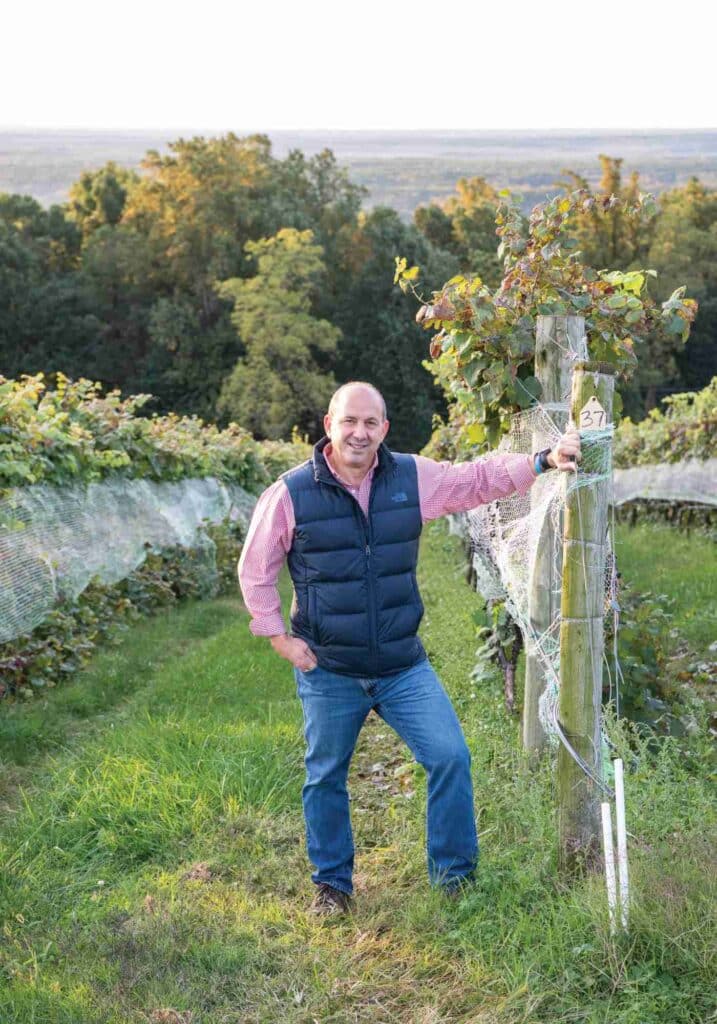
Monticello Cup Gold Medalists
In alphabetical order by winery, here are the Gold Medal wines from the 2023 Monticello Cup Wine Competition:
- Afton Mountain Vineyards – 2017 Tradition
- Barboursville Vineyards – 2016 Octagon
- Chiswell Farm & Winery – 2021 Sauvignon Blanc
- Cunningham Creek Winery – 2019 Petit Verdot
- Flying Fox Vineyards – 2017 Cabernet Franc
- Grace Estate Winery – 2021 Le Gras Baril
- Hark Vineyards – 2019 Petit Verdot
- Hazy Mountain Vineyards – 2021 Petit Manseng
- Jefferson Vineyards – 2019 Meritage
- King Family Vineyards – 2019 Meritage
- Michael Shaps (2) – 2019 Petit Manseng & 2017 Meritage
- Pippin Hill Farm & Vineyards – 2017 Wild Acre Reserve
- Pollak Vineyards (2) – 2019 Petit Verdot & 2019 Meritage
- Stinson Vineyards – 2021 Petit Verdot
- Veritas Vineyards & Winery – 2021 Veritas Reserve
To see who won the Cup in recent years, read more about the 2022 Monticello Cup Winners and the 2020 Monticello Wine Trail Awards. To learn about the best wines of 2023 in the state of Virginia, read about the 2023 Governor’s Cup Competition. ~
R. L. JOHNSON is our co-publisher and creative director, Robin Johnson Bethke, who began her career as a professional photographer in Los Angeles before moving into graphic design and art direction when she relocated to Charlottesville in 1994. As our company’s co-founder and visionary, she enjoys all aspects of the publishing process from story conception to graphic design to photography. Her work is often seen in many of our publications.

